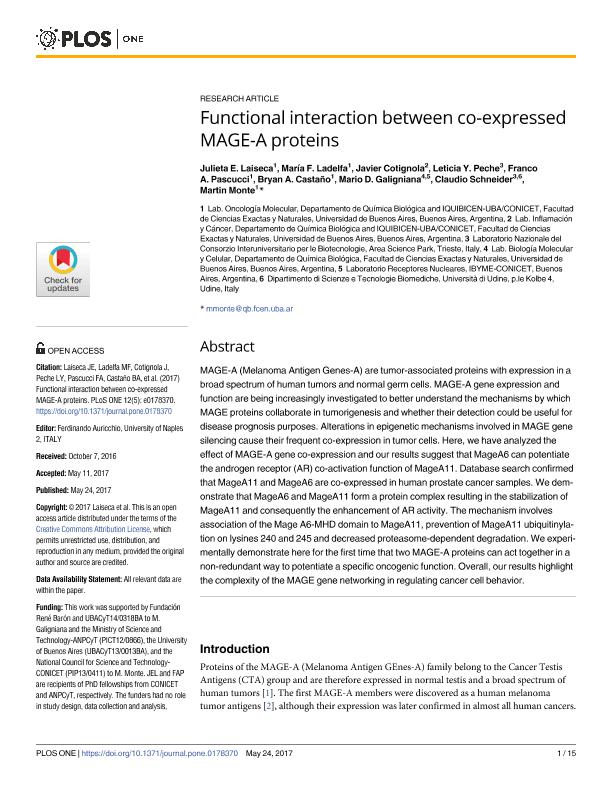Artículo
MageA6 expression protects MageA11 from proteasome-dependent degradation
Laiseca, Julieta Eva ; Ladelfa, Maria Fatima
; Ladelfa, Maria Fatima ; Cotignola, Javier Hernan
; Cotignola, Javier Hernan ; Peche, Leticia Y.; Pascucci, Franco Andrés
; Peche, Leticia Y.; Pascucci, Franco Andrés ; Castaño, Bryan Alain Alexis; Galigniana, Mario Daniel
; Castaño, Bryan Alain Alexis; Galigniana, Mario Daniel ; Schneider, Claudio; Monte, Martin
; Schneider, Claudio; Monte, Martin
 ; Ladelfa, Maria Fatima
; Ladelfa, Maria Fatima ; Cotignola, Javier Hernan
; Cotignola, Javier Hernan ; Peche, Leticia Y.; Pascucci, Franco Andrés
; Peche, Leticia Y.; Pascucci, Franco Andrés ; Castaño, Bryan Alain Alexis; Galigniana, Mario Daniel
; Castaño, Bryan Alain Alexis; Galigniana, Mario Daniel ; Schneider, Claudio; Monte, Martin
; Schneider, Claudio; Monte, Martin
Fecha de publicación:
05/2017
Editorial:
Public Library of Science
Revista:
Plos One
ISSN:
1932-6203
Idioma:
Inglés
Tipo de recurso:
Artículo publicado
Clasificación temática:
Resumen
MAGE-A (Melanoma Antigen Genes-A) are tumor-associated proteins with expression in a broad spectrum of human tumors and normal germ cells. MAGE-A gene expression and function are being increasingly investigated to better understand the mechanisms by which MAGE proteins collaborate in tumorigenesis and whether their detection could be useful for disease prognosis purposes. Alterations in epigenetic mechanisms involved in MAGE gene silencing cause their frequent co-expression in tumor cells. Here, we have analyzed the effect of MAGE-A gene co-expression and our results suggest that MageA6 can potentiate the androgen receptor (AR) co-activation function of MageA11. Database search confirmed that MageA11 and MageA6 are co-expressed in human prostate cancer samples. We demonstrate that MageA6 and MageA11 form a protein complex resulting in the stabilization of MageA11 and consequently the enhancement of AR activity. The mechanism involves association of the Mage A6-MHD domain to MageA11, prevention of MageA11 ubiquitinylation on lysines 240 and 245 and decreased proteasome-dependent degradation. We experimentally demonstrate here for the first time that two MAGE-A proteins can act together in a non-redundant way to potentiate a specific oncogenic function. Overall, our results highlight the complexity of the MAGE gene networking in regulating cancer cell behavior.
Palabras clave:
MAGE
,
STABILITY
,
AR
Archivos asociados
Licencia
Identificadores
Colecciones
Articulos(IBYME)
Articulos de INST.DE BIOLOGIA Y MEDICINA EXPERIMENTAL (I)
Articulos de INST.DE BIOLOGIA Y MEDICINA EXPERIMENTAL (I)
Articulos(IQUIBICEN)
Articulos de INSTITUTO DE QUIMICA BIOLOGICA DE LA FACULTAD DE CS. EXACTAS Y NATURALES
Articulos de INSTITUTO DE QUIMICA BIOLOGICA DE LA FACULTAD DE CS. EXACTAS Y NATURALES
Citación
Laiseca, Julieta Eva; Ladelfa, Maria Fatima; Cotignola, Javier Hernan; Peche, Leticia Y.; Pascucci, Franco Andrés; et al.; MageA6 expression protects MageA11 from proteasome-dependent degradation; Public Library of Science; Plos One; 12; 5; 5-2017; 1-15
Compartir
Altmétricas



